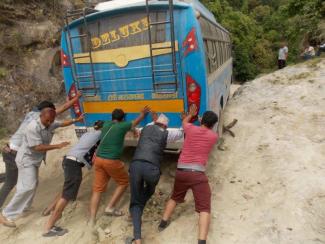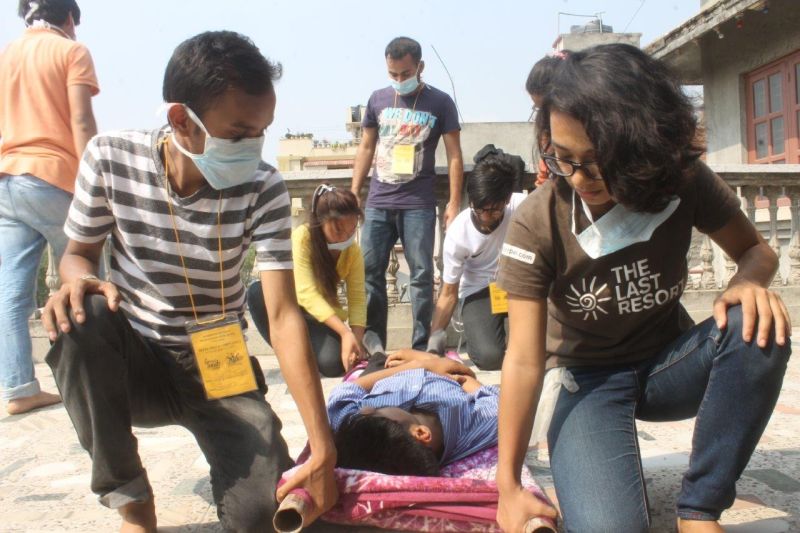Transformative emergency aid
Aid in itself is not enough

Many people see rapid delivery of emergency relief as a humanitarian duty. Indeed, aid is sorely needed. Examples are the threat of famine still looming over East Africa or the persecution of Myanmar’s Rohingya, forced to flee to Bangladesh with nothing but the clothes on their back.
Aid is not just an issue of humanitarian empathy. It is enshrined in law. The International Covenant on Economic, Social and Cultural Rights, which the UN General Assembly adopted in 1966, states that every person on Earth has a right to social security, freedom from hunger and the highest attainable standard of health. This applies before, during and after a disaster. The entitlement to human rights cannot be suspended.
Nonetheless, the gulf between the global need for aid and the resources deployed for this purpose keeps widening. The UN Office for the Coordination of Humanitarian Affairs (OCHA) provisionally puts the need for humanitarian aid at $ 25 billion in 2018 (see interview with Mark Lowcock). At the same time, the number of people who depend on humanitarian aid is said to be five percent higher than in 2017. Incidentally, only around $ 13 billion of the $ 22.2 billion called for last year were actually pledged.
Obviously, the humanitarian system is reaching its limits, and this trend is refocusing attention on the issue of efficiency. If there is not enough money, how can what is available be used efficiently to reach as many people as possible? This question is valid, but it is based on the technical assumption that aid and cooperation are measurable. In truth, courage, creativity and solidarity are hard to quantify and express in budget items.
The business of humanitarian aid
Attempts to make humanitarian aid more efficient have long since given rise to a market-driven system. Banks and mobile-communications providers, for instance, have become coveted partners of humanitarian agencies because their infrastructures facilitate a wide range of cash-transfer services. The European Commission’s Directorate-General for European Civil Protection and Humanitarian Aid Operations (ECHO) is open to cooperation with private-sector companies under the condition that this is in aid recipients’ best interests. The qualifying clause may sound reassuringly reasonable, but it deserves emphasis that business enterprises, by definition, maximise profits, especially if they are not bound by other norms. There is no provision, on the other hand, to strengthen local actors.
In the name of “resilience”, market-radical doctrines such as personal responsibility and efficiency are increasingly shaping humanitarian efforts. In principle there is nothing wrong with the idea to help individuals and communities to cope better with – and recover faster from – disasters, but the problem is that this approach ultimately makes victims responsible for their own welfare and fails to address the causes of disasters. Once people have been prepared to survive the next catastrophe, demands for fundamental change can be ignored.
That is no way to meet the ever-increasing need for aid. The root causes of poverty must be tackled. Medico international sees aid as part of a broader political response to overcome hardship. What is needed is long-term empowerment. The social, political and cultural circumstances in which aid becomes necessary must be analysed, and aid must focus on transforming those circumstances, in order to make aid unnecessary eventually. This basic idea guides development aid and we should insist on applying it to emergency aid as well.
Actors must consider the impact of aid – especially if the deployment of financial and human resources is massive, as was the case after the earthquake in Haiti in 2010. First of all, the “do no harm” principle must apply. This means checking whether the emergency relief delivered puts people into additional danger. In a broader sense, it means designing aid in a way that does not contribute to restoring or consolidating exploitative power structures.
If aid provides only a temporary fix for problems that arise from unjust social settings, it becomes self-perpetuating, by providing legitimacy and creating additional scope for future relief work. It becomes aid for aid’s sake.
In contrast, medico international, a Frankfurt based non-governmental organisation, and its project partners take a transformative approach. The three-pronged mission is to defend, criticise and overcome aid. This approach of aid in a spirit of critique depends on all partners’ social and political commitment. An underlying tenet is the emphasis on human rights.
The relationships between those who deliver aid and those who receive it are constantly reviewed. That includes medico’s relationship with partner organisations, and partner organisations’ relationship with people in need.
Strengthening local partners
This transformative approach not only accepts the ownership of local partners, it encourages their resolve and seeks eye-level cooperation even though there actually is a (financial) dependence. Partnership does not mean a division of labour in regard to funding and implementation. It means open dialogue, discussion, mutual learning and long-term cooperation. Medico support is intended to strengthen independent local actors.
This is especially important as media interest quickly wanes in the aftermath of a disaster, and international organisations then tend to withdraw money and staff from the area concerned. In contrast, the local organisations – which include local governments, trade unions, human-rights organisations, health-care initiatives and self-help groups – remain on the scene. For medico, partnership is a means to an end – a platform on which to build solidarity and make a joint contribution to societal change.
Not all causes can be tackled of course. No humanitarian project can prevent an earthquake. However, not every earthquake has to become a disaster. Housing conditions, the quality of health care and social and economic safety nets are factors that influence whether – and for whom – a natural event turns into a catastrophe. Transformative emergency aid is delivered in association with local partners and strives to do more than help in a crisis. It is also meant to ensure sustainable progress in terms of covering basic needs.
Medico goes even further, insisting on legal entitlements to relief. Where aid is needed, its delivery must not depend on charity or compassion. Humankind needs a formal social compact – and that will ultimately mean putting an end to aid. By going beyond aid, we will overcome the need for aid.
Hendrik Slusarenka manages emergency aid at medico international.
slusarenka@medico.de
www.medico.de









